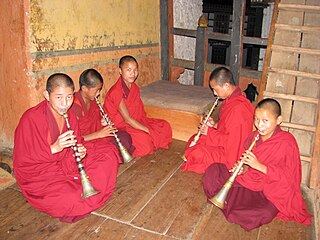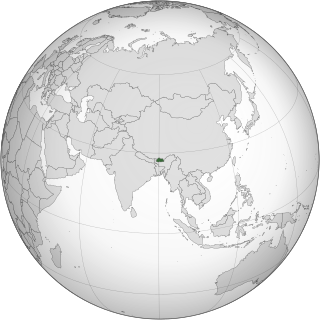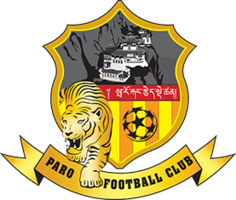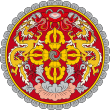Telecommunications in Bhutan includes telephones, radio, television, and the Internet.

The music of Bhutan is an integral part of its culture and plays a leading role in transmitting social values. Traditional Bhutanese music includes a spectrum of subgenres, ranging from folk to religious song and music. Some genres of traditional Bhutanese music intertwine vocals, instrumentation, and theatre and dance, while others are mainly vocal or instrumental. The much older traditional genres are distinguished from modern popular music such as rigsar.

The Royal Bhutan Army is a branch of the armed forces of the Kingdom of Bhutan responsible for maintaining the country's territorial integrity and sovereignty against security threats. The Druk Gyalpo is the Supreme Commander in Chief of the RBA. The Chief Operations Officer is Goonglon Gongma Batoo Tshering.
Kuensel is the national newspaper of the Kingdom of Bhutan. It was the only local newspaper available in Bhutan until 2006 when two more newspapers were launched. The government of Bhutan owns 51% of Kuensel while 49% is held by the public.

The Bhutan Broadcasting Service is a state-funded radio and television service in Bhutan. A public service corporation which is fully funded by the state and it is the only service to offer both radio and television in the kingdom, and is the only television service to broadcast from inside the Bhutanese border. The use of telecommunications is currently governed through the Information, Communications and Media Act of 2006.

The Bhutan Observer was Bhutan's first private bilingual newspaper. It was launched as a private limited company by parent company Bhutan Media Services (BMS), and began publishing on June 2, 2006, in Thimphu. Its Dzongkha edition was called Druk Nelug, and the newspaper maintained an online service in English until 2013.

Lesbian, gay, bisexual and transgender (LGBT) people in Bhutan face legal challenges that are not faced by non-LGBT people. Bhutan does not provide any anti-discrimination laws for LGBT people, and same-sex unions are not recognised. However, same-sex sexual activity was decriminalised in Bhutan on 17 February 2021.

Paro Football Club is a Bhutanese professional football club based in Paro that competes in the Bhutan Premier League, the top level of Bhutanese football.

A Bhutanese passport is a document that authorizes and facilitates travel and other activities in Bhutan or by Bhutanese citizens. Foreign travel passports are issued to citizens of Bhutan for international travel by the Ministry of Foreign Affairs. It is valid for all countries unless otherwise endorsed.

The Druk Chirwang Tshogpa was a Bhutanese political party. It was registered on January 7, 2013. In the primary round of the 2nd National Assembly elections held in 2013, the DCT had 12,457 votes and came fourth place, not winning in any constituency, and so could not take part in the final round. The Election Commission of Bhutan announced on February 26, 2018, that the Party was being deregistered on its own request. The party then merged with Druk Phuensum Tshogpa.

The cinema of Bhutan is a small but emerging industry, having started in the mid-1990s. It has since been supported by government officials and different businesses.
Kezang Dorji is a Bhutanese rapper, social worker, and a youth icon. He was named "The Rising Star of Bhutan" in 2016 by Kuensel. He is also the recipient of the prestigious South Asian Youth Award 2018. Kezang is the first Bhutanese artist to be featured on BBC News (2018) and CNN.

The Bhutan Centre for Media and Democracy (BCMD) is the first Civil Society Organisation in Bhutan. It was launched in 2008 coinciding with the country's first government elections, which heralded a new era of self-governance following the abdication of the fourth king of Bhutan, Jigme Singye Wangchuck. At the same time, the media landscape saw the arrival of new private newspapers and radio stations, as well as social media via mobile telephones and the Internet. The stated mission of BCMD is to "nurture democracy in Bhutan through civic engagement, public discourse and media literate citizens".

Tandi Dorji is a Bhutanese politician who served as Foreign Minister for Bhutan from November 2018 to 2024. He has been a member of the National Assembly of Bhutan, since October 2018.

Dasho Sherub Gyeltshen is a Bhutanese politician who served as the Minister for Home and Cultural Affairs from November 2018 to 6 May 2021 when he resigned. He was a member of the National Assembly of Bhutan from October 2018 to May 6, 2021.
Ugen Tenzin is a Bhutanese politician who has been a member of the National Assembly of Bhutan, since October 2018. Previously, he was a member of the National Assembly of Bhutan from 2008 to 2013.
Kinga Penjor is a Bhutanese politician who has been a member of the National Assembly of Bhutan, since October 2018.

The COVID-19 pandemic in Bhutan was a part of the worldwide pandemic of coronavirus disease 2019 caused by severe acute respiratory syndrome coronavirus 2.
The Bhutan Media Foundation is a public-benefit Civil Society Organisation (CSO) established under Royal Charter and with seed funding from His Majesty King Jigme Khesar Namgyel Wangchuck, in Thimphu on 21 February 2010. The charter was collectively written by media professionals. An editorial in Bhutan Today, described the CSO as "a beacon of hope" in developing a professional media industry.














